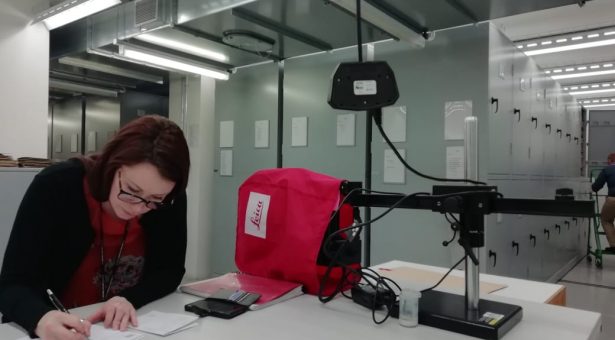Ann-Marie explores the Natural History Museum

Ann-Marie, a student at the Quadram Institute Bioscience, had a keen interest in experiencing research in a museum setting and therefore choose to complete her PIPs placement at the Natural History Museum in London. Ann-Marie found her placement through a list of placements advertised through My Career Central. By the end of her second year, Ann-Marie felt comfortable with the progress made towards her PhD and so choose to complete her placement during the third year of her PhD.
Before this placement, Ann-Marie was interested in understanding more about specimen curation and undertaking archival DNA extraction. Her time with the Natural History Museum afforded Ann-Marie the opportunity to better understand the curation system, find out the most appropriate protocols for archival plant disruption and to carry out research to generate a time line of agricultural practices to select specimens from potentially interesting time points. Using the skills gained, Ann-Marie compiled datasheets from the digitised online herbarium collection of wheat and barley specimens in the collection. Ann-Marie also undertook research within the museum’s Herbarium collection and also used sample disruption, DNA extraction and sequencing library preparation to understand archival samples. During her placement Ann-Marie had the opportunity to learn more about topics, outside of her PhD work, including agronomy, plant genomes, crops and the different techniques that can be used to carry out DNA extraction from ancient and archival samples.
Ann-Marie feels that she developed many new skills during her internship, particularly in sample disruption and DNA extraction techniques for archival samples. It enabled her to better understand what is involved in museum curation and the processes involved in sampling herbarium specimens. During her internship, Ann-Marie also generated new data which will help in understanding the DNA quality of historical samples and how land use and agronomy changes have selected for new alleles in barley. Ann-Marie reflected that, “I thought it was a really nice environment to work in with people doing research in a wide variety of fields from micro-plastics in the Thames, penguins in Antarctica, asteroids and palaeontology”. Other opportunities included attending a variety of talks and meetings both within and with other institutions and assisting with the 2018 Young Systematists Forum in the museum. Helping to organise this forum, along with working in a different field from her PhD, has given Ann-Marie the confidence to be more open to new opportunities in the future.
Overall, Ann-Marie is very positive about her internship and the opportunity it gave her to both learn new skills and to work with researchers in completely different fields. Ann-Marie’s advice to future PIPS students is to, “step outside your comfort zone and give something different a go,” and to be open to any training and networking opportunities that are offered to you.
